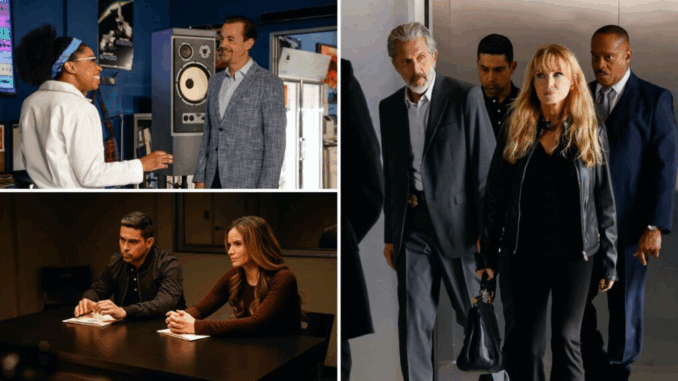
Austin Stowell on the Weight of the Legacy
Taking on the role of Leroy Jethro Gibbs, a character immortalized by Mark Harmon, is no small feat. Austin Stowell doesn’t sugarcoat it — emerging from deep personal experience, he admits he’ll never feel completely at ease inhabiting such a legendary role — and that’s exactly how it should be.
“I’ll Never Be Comfortable” — A Drive, Not Discomfort
Stowell told Us Weekly that he’s grateful for the supportive cast and crew, but when referred to as “No. 1 on the call sheet,” he pushes back.
“I never want to look at it that way. … It is us. It is all about this team.”wdbo.com+11artstribune.com+11winnipegfreepress.com+11
He refuses to let personal comfort overshadow the collective effort — instead, the tension fuels his performance.
Traumatic Grounding—Personal Grief Informs Gibbs’ Emotions
He draws from his own experiences with grief to portray Gibbs authentically.
“I have gone through what the stages of grief are like…” artstribune.com
That real emotional core makes him an ideal fit for a character reeling from loss, but it also means he carries that weight home.
Pressure as Privilege—Stepping Into Big Shoes
Interviewed by Showbiz Junkies, Stowell acknowledged the challenge of playing a character with established rules, some of which may not even originate with Gibbs himself.
“Pressure is a privilege… To step into the shoes [of Gibbs] gives me purpose to get out of bed in the morning.” showbizjunkies.com
So, the discomfort isn’t anxiety — it’s a daily reminder of the responsibility involved.
Mentorship From Mark Harmon Helps—But It’s Still No Comfort Zone
Stowell has had ongoing conversations with Harmon, talking about what it takes to “be the leader of this set and crew”artstribune.com+11newsday.com+11winnipegfreepress.com+11. Yet, even with Harmon’s guidance, Stowell admits he’s still grappling with the enormity of the role:
“If Mark Harmon were here… he would shake his head and say, ‘You don’t know what’s coming.’ I don’t think there is any way to prepare [to lead a show].” artstribune.com
That’s clarity — not fear.

Why This Honest Discomfort Matters
Keeps Him Grounded and Human
Rather than letting fame define him, Stowell uses his own vulnerability to channel Gibbs’ humanity — something Harmon originally expressed in the series.
“Gibbs doesn’t wear a cape… use his brain and use his heart.”winnipegfreepress.com+3newsday.com+3local10.com+3
Supports Tight-Knit Collaboration
By refusing a “star” label, he honors the team dynamic — creating space for everyone to flourish.
Emotional Toll—The Role That Doesn’t Turn Off
Stowell has confessed the emotional scenes don’t just stay on set:
“…I’ve learned to accept it… it makes me a better actor… more understanding.”wdio.com+7local10.com+7wdbo.com+7screenrant.com+11artstribune.com+11newsday.com+11
That openness to discomfort helps him deliver a raw, layered performance that resonates with audiences.
Embracing the Role Through Personal Parallels
He’s not just playing a character—he sees himself in Gibbs:
-
Values analog simplicity, stirring a strong connection to Gibbs’ 1991 worldwdio.com+9newsday.com+9artstribune.com+9
-
Shares emotional depth and respect for nature, justice, and structure
This alignment helps his role feel authentic, even if comfort remains elusive.
The Balance Between Legacy and Identity
Stowell walks a tightrope — honoring Harmon’s legacy while staking out his own version of Gibbs:
-
Incorporating early versions of Gibbs’ rules screenrant.com
-
Differentiating young Gibbs emotionally — he’s not a carbon copy
-
Leaning into trauma, grief, and emerging leadership to mark a unique era in Gibbs’ history
Why Fans Should Embrace His Discomfort
Expect a Gibbs With Depth
This Gibbs isn’t cold or iconic—he’s wounded, striving, and very real. That emotional honesty is compelling, and borne from Stowell’s own discomfort.
A Shared Journey for Actor and Audience
As Stowell learns, stumbles, and rises, fans witness a co-evolution—a touching parallel to how Gibbs himself came into being.
Conclusion
Austin Stowell’s refusal to be comfortable playing Gibbs isn’t insecurity—it’s purpose. That discomfort drives honesty, emotional integrity, and a collaborative spirit. We’re not just watching a legendary character reborn — we’re witnessing an actor forging his own path, informed by grief, mentorship, and unwavering dedication.
The result? A performance that feels lived-in, layered, and undeniably real.
🙋♂️ FAQs
Q1: Will Stowell ever feel fully comfortable as Gibbs?
No—he believes the responsibility and emotional gravity ensures he never should.
Q2: How does his personal grief help the role?
It grounds his portrayal in authentic emotional experiences, enriching Gibbs’ trauma and growth.
Q3: Did Mark Harmon mentor him?
Yes—Harmon has mentored Stowell on leadership and the nuances of Gibbs’ legacyscreenrant.com+1showbizjunkies.com+1.
Q4: Does being called ‘No. 1’ make Stowell uncomfortable?
Intentionally. He sees the show as a team, not a starring vehicle .
Q5: How is this Gibbs different from Harmon’s version?
He’s more emotional, less stoic—a man just beginning his journey, informed by real grief and raw authenticity.